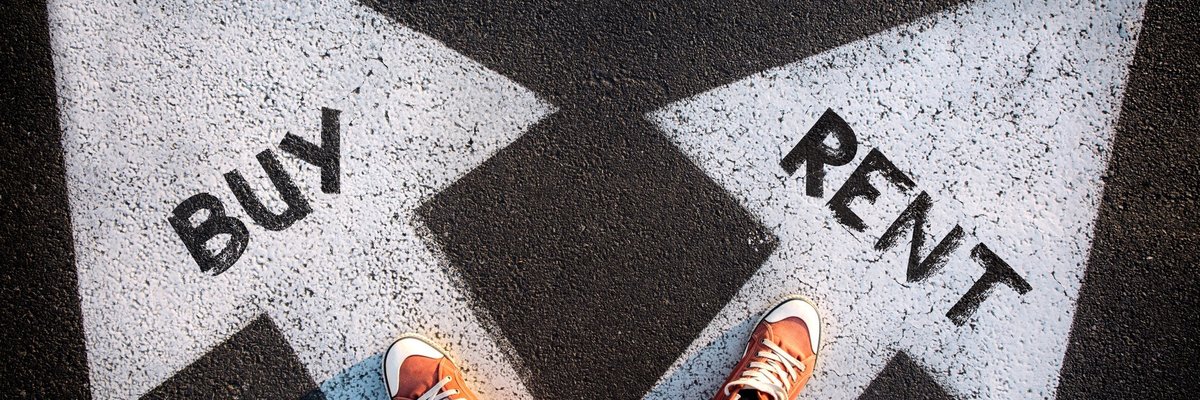3 Compelling Reasons Why Renting Beats Having a Mortgage
KEY POINTS
- Renting often costs less, freeing up cash for other financial goals.
- Maintenance costs can really bite if you're not ready for them.
- The flexibility of renting is invaluable at certain points of life.
Homeownership can mean different things to different people. For some, it's central to the American Dream and symbolizes freedom and stability. However, as some homeowners will tell you, it's all too easy to get trapped in a property that costs way more than you'd planned.
There are many scenarios when renting is a better choice, both in terms of your lifestyle and your money. Here are some reasons why.
1. Renting is often cheaper
Mortgage rates are finally starting to fall a little. But property prices are still going up and it isn't getting any easier to buy a home. Renting costs less, making it a better financial decision for many Americans right now. According to ATTOM's latest rental affordability report, on average, it costs less to rent a three-bedroom home in almost 90% of the country than it does to own one.
People argue that you're throwing money away when you rent because you're not building equity in your home. But mortgage interest costs money too, particularly in the first few years. More so if you have to take on additional debt because you can't afford the cost of owning a home.
We can turn the idea of building equity on its head. Let's say you rent and invest the money you are saving by not owning a home. Investing in the stock market is another form of building wealth -- and one that doesn't come with a leaking roof or a difficult homeowners association.
If you still want to buy
If you decide you're ready to pay the extra costs of homeownership, keep them as low as possible. That means shopping around to find the best mortgage lender and having solid financial foundations. For example, making a down payment of at least 20% will mean you don't have to pay private mortgage insurance. And having a good or excellent credit score will translate into lower rates.
Better Mortgage is dedicated to making homeownership more affordable. Its technology-driven process translates into quicker decisions and lower fees. Click here to check rates and find out how Better Mortgage wants to change the status quo.
2. Owning a home can cost more than you think
A whopping 82% of recent home buyers have regrets, per a Clever Real Estate survey. Not only did many people go over their budget and wind up in financial difficulty, but they also underestimated the extra costs. Indeed, the most common reason for buyer's remorse is the amount of maintenance involved.
To give you an example. It is raining as I write this article. That matters because the roof on the property I own is leaking. Not only will the roofers be expensive, they also aren't available for another three weeks. This week's issue with the roof comes three weeks after I paid for a plumber to fix my shower. Those costs add up.
When you rent, you don't need to think about maintenance costs. All you need to do is call the landlord/landlady and it's on them to get it fixed. Plus, maintenance and repairs are only one of many hidden costs of owning a home. There's also homeowners insurance, property taxes, and, in some cases, homeowners association fees.
If you still want to buy
Research all the costs of homeownership, including insurance and taxes, and make a budget. The more realistic you can be about how much your home will cost, the less likely you are to regret your decision.
One good rule of thumb is to plan to spend about 1% of the property price on annual maintenance. So if you bought a $350,000 home, estimate you'll spend $3,500 a year on maintenance.
3. Homeownership is a huge commitment
When you buy a house, you'll pay closing costs of around 2% to 5% of your loan. That's one reason financial advisors suggest staying in a property for at least five years. That gives you time to recoup some of that money.
That's a big commitment, especially if you're not ready to be tied to one place just yet. Perhaps you're not sure where your job will take you. You might plan on getting married and having kids. Or maybe you want to travel. Life takes us in different directions. Far from the freedom promised by the American Dream, a home can become a millstone.
One of the challenges in today's market is that some people who bought when rates were super low may struggle to afford a new mortgage at today's rates. Indeed, 58% of homeowners surveyed by West Shore Home said they felt "locked in." They are having to put off major life decisions and turn down jobs because they can't afford to move.
If you still want to buy
Think carefully about whether you're ready to put down roots and how many years you're planning to stay. Also, resist the temptation to stretch your budget to buy a home. Not only does it put you at a bigger risk of default, it also gives you less flexibility if you need to move.
Renting often makes all the sense in the world
If you can't afford to buy a house right now -- or aren't in the right stage of your life, that's OK. Don't let other people's perceptions and life goals push you into homeownership. It is probably the biggest financial decision you'll ever make. Make sure you're ready for it.
Our Research Expert




